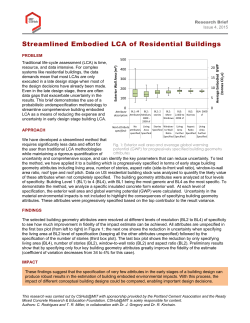
Document 216217
THE MOST TYPICAL MISTAKES IN LCA AND HOW TO AVOID THEM o Course subject: An introduction to the technique of LCA via in-‐depth case studies of real life applications, demonstrating both good and bad practices and advantages and disadvantages of different approaches. The challenges and importance of completeness, transparency and consistency. o Course outline (lectures and exercises on): § Scoping the study: identification of the product’s functional unit and the alternatives to be compared (case study from the steel packaging industry). § Product system boundaries: Cut-‐off rules, boundaries between subsequent life-‐ cycles (recycling/co-‐production) and boundaries between the technosphere and the environment (case study on bio-‐materials) § The importance of the time horizon and the geographical horizon (case study on bio-‐fuels) § Eco-‐design techniques for exploring improvement options and barriers to radical change. § Consequential and attributional LCA (case study on eco-‐labelling) § Data sources, the importance of data management, documentation and data quality assessment. Examples and exercises with real-‐life data, real-‐life errors and state-‐of-‐the-‐art data validation tools and techniques. § Using old data to support current decisions with future consequences: The importance of scenarios and forecasting. § Calculation routines in LCA. Simple example with a matrix and its inversion in Excel and a dedicated LCA software. § Impact assessment: Distance-‐to-‐target approaches versus impact pathway approaches. Midpoint versus endpoint. Characterisation, normalisation and weighting, and the implicit value choices. Monetarisation of impacts. § Uncertainty analysis, the sources of uncertainty, the difference between precision and accuracy, its use in reducing the data collection effort, and how to communicate uncertainty (case study from the waste management industry) o Teaching staff: Professor Bo Weidema, Dr. Miguel Brandão and Jenna Watson o Learning outcomes: Understanding the challenges and good and bad practices in LCA practice, related to scoping, system boundaries, data management, system modelling, impact assessment and uncertainty management. Understanding controversial aspects of LCA and potential solutions. Understanding the prerequisites for realising the full potential of LCA. Ability to deal with issues regarding consistency, completeness and transparency in LCA. o Dates: This course is offered in Barcelona as short course from April 17-‐19th, 2013. o Location: ESCI-‐UPF, Passeig Pujades 1, Barcelona. o Course type: Short course o Academic recognition: 1 ECTS o Prerequisites: Masters degree or equivalent. Must bring own laptop computer. o Format: 10 hours lectures. 10 hours workshops/exercises. Additionally 5 hours follow-‐up course work if ECTS-‐points are requested. o Minimum and Maximum number of participants: 4-‐24. o Status: Confirmed o Price: 2500 Euro for professionals / 500 Euro for students. o Currently available for 50% off regular price: 1250 euro for professionals / 500 euro for university personnel / 250 euro for students. o Does not include travel, accommodation and meals. Please ask for our list of accommodation recommendations. o Contact person and email: Miguel Brandão; miguel@ilca.es
© Copyright 2025





















